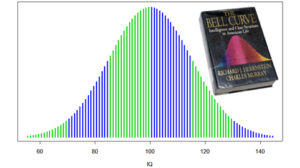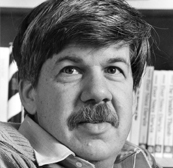
Photo courtesy: Science Museum of Minnesota
Arthur Jensen, a protégé of British educational psychologist Cyril Burt and an educational psychologist at University of California-Berkeley, was well known for his work in psychometrics and differential psychology. In the “nature versus nurture” debate, Jensen took a hereditarian position, claiming that genetics played a important role in behavioral traits, such as intelligence. He published a controversial work in 1969 called “How Much Can We Boost I.Q. and Scholastic Achievement?” The opinion he put forward in the publication was that over 70% of the within-race IQ variability was due to genetics, and the rest due to environmental influences, and that as a result programs designed to boost black IQ had failed, simply because the 1Q of African Americans could not be increased.
- In 1981, Stephen Jay Gould, the noted Harvard paleontologist and evolutionary biologist, published The Mismeasure of Man, in which he debunked biological deterministic theories of intelligence based on craniometry and psychological testing.
- American biologist and geneticist Richard Lewontin, concerned by what he viewed as the oversimplification of genetics, co-authored Not In Our Genes, with Steven Rose and Leon Kamin in 1984. The book questioned the theory of heritability of human behavioral traits such as intelligence as measured by IQ tests.
- Within both the mainstream media and the scientific community, large numbers of people rallied to both support and criticize The Bell Curve, published in 1994 by Richard J. Herrnstein and Charles Murray. Some denounced the book and its authors as supporting scientific racism. In 1996, Stephen Jay Gould updated The Mismeasure of Man, rebutting Bell Curve authors Herrnstein and Murray’s theories on race and intelligence.

Credit: Harvard University News Office
“…Our ways of learning about the world are strongly influenced by the social preconceptions and biased modes of thinking that each scientist must apply to any problem. The stereotype of a fully rational and objective ‘scientific method,’ with individual scientists as logical robots, is self-serving mythology.”
– Stephen J. Gould, “In the Mind of the Beholder,” Natural History, February 1994
Paleontologist, evolutionary biologist, and historian of science Stephen J. Gould was an immensely influential and widely read writer of popular science. He opposed pseudoscience in the service of racism, which he saw as a form of cultural oppression. Along with Niles Eldredge, Gould helped develop the theory of punctuated equilibrium in 1972. This theory postulates that evolutionary change occurs relatively rapidly in comparatively brief periods of environmental stress, separated by longer periods of evolutionary stability.




